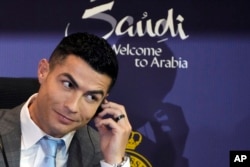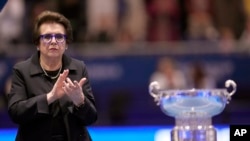At the beginning of 2023, Saudi Arabia’s growing influence on professional golf, and sports in general, was a concern for players and their fans.
Twelve months later, discussions are very different. Worries about the supposed threat of “sportswashing” - using sports to improve a country’s reputation – have declined. Concerns about moral issues - the line between “right” and “wrong” - have also gone down. Attention now is fixed on just how rich the Saudis might make the athletes.
What has changed?
Two major events caused the change. On June 6, the PGA Tour announced it was looking to go into business with the Saudi group that was paying for the kingdom’s LIV Golf, which the tour had labeled as a threat.
Then, six months later, Jon Rahm, the world’s third-ranked professional golfer and an early resister of LIV, decided to join LIV for a deal reported to be worth about $500 million.
Other important events included the continuing talks between the Saudis and leaders of professional tennis organizations. In addition, the push into soccer will bring the world’s biggest sporting event, the World Cup, to Saudi Arabia in 2034.
Dan Durbin is director of the Institute of Sports, Media and Society at the University of Southern California (USC). Durbin said of the Saudi plans: “You’re investing in sports, which is one of the few growth industries in the world....It is, as far as we can see, an almost endless growth industry.”
Saudi’s investments
In early 2022, the discussion about golf centered on Saudi Arabia’s Public Investment Fund, or PIF, in LIV Golf. At the time, six-time major winner Phil Mickelson made a critical comment about Saudi Arabia related to the murder of the Washington Post writer Jamal Khashoggi.
Mickelson’s comment set the dividing line in what was viewed as a moral question. And the discussion ignored how important Saudi Arabia is in the world economy. The Saudis gain much of their importance by supplying around 15 percent of the world’s petroleum.
Besides golf, the fund offered one of soccer’s biggest stars, Cristiano Ronaldo, $200 million to join a Saudi team. And it also owns the Premier League’s Newcastle soccer club.
As the calendar turns to 2024, there is no sign of Saudi involvement in sports slowing. The Saudis are hosting a Formula One auto race. They are also looking to invest some $5 billion into cricket’s Indian Premier League with an eye on making it bigger in other countries.
The ATP, which runs men’s professional tennis, has a five-year deal to hold one of its biggest events in the Saudi port city of Jeddah. Talks between the Saudis and the women’s tour are reportedly ongoing.
In a sign of how public discussions have changed, Billie Jean King, who fought for equal pay for women in sports, has said bringing women’s tennis to the kingdom might not be all bad despite its poor record on women’s rights.
“I don’t think you really change unless you engage,” she said earlier this year.
Durbin says sports is a way for the kingdom to be seen as more than an oil-producer with a bad human-rights record.
“For decades, sports has been the center of soft diplomacy,” he said. “You try to create a positive response and feeling about your ethics because you’re holding to the rules of sports.”
I’m John Russell.
Eddie Pells reported on this story for the Associated Press. John Russell adapted it for VOA Learning English.
________________________________________
Words in This Story
reputation—n. the common opinion that people have about someone or something
rank –v. to place someone in a particular position among a group of people that are being judged according to ability
cricket – n. a game played on a large field by two teams of players who try to score runs by hitting a small ball with a bat
engage -- v. to become actively involved
decade -- n. a period of 10 years
response –n. something that is said or written as a reply to something








Forum